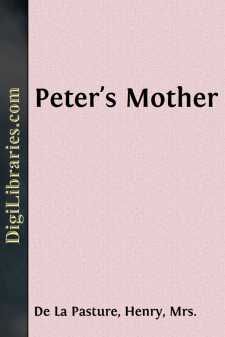Categories
- Antiques & Collectibles 13
- Architecture 36
- Art 48
- Bibles 22
- Biography & Autobiography 813
- Body, Mind & Spirit 142
- Business & Economics 28
- Children's Books 15
- Children's Fiction 12
- Computers 4
- Cooking 94
- Crafts & Hobbies 4
- Drama 346
- Education 46
- Family & Relationships 57
- Fiction 11829
- Games 19
- Gardening 17
- Health & Fitness 34
- History 1377
- House & Home 1
- Humor 147
- Juvenile Fiction 1873
- Juvenile Nonfiction 202
- Language Arts & Disciplines 88
- Law 16
- Literary Collections 686
- Literary Criticism 179
- Mathematics 13
- Medical 41
- Music 40
- Nature 179
- Non-Classifiable 1768
- Performing Arts 7
- Periodicals 1453
- Philosophy 64
- Photography 2
- Poetry 896
- Political Science 203
- Psychology 42
- Reference 154
- Religion 513
- Science 126
- Self-Help 84
- Social Science 81
- Sports & Recreation 34
- Study Aids 3
- Technology & Engineering 59
- Transportation 23
- Travel 463
- True Crime 29
Peter's Mother
Description:
Excerpt
CHAPTER I
Above Youlestone village, overlooking the valley and the river, and the square-towered church, stood Barracombe House, backed by Barracombe Woods, and owned by Sir Timothy Crewys, of Barracombe.
From the terrace before his windows Sir Timothy could take a bird's-eye view of his own property, up the river and down the river; while he also had the felicity of beholding the estate of his most important neighbour, Colonel Hewel, of Hewelscourt, mapped out before his eyes, as plainly visible in detail as land on the opposite side of a narrow valley must always be.
He cast no envious glances at his neighbour's property. The Youle was a boundary which none could dispute, and which could only be conveniently crossed by the ferry, for the nearest bridge was seven miles distant, at Brawnton, the old post-town.
From Brawnton the coach still ran once a week for the benefit of the outlying villages, and the single line of rail which threaded the valley of the Youle in the year 1900 was still a novelty to the inhabitants of this unfrequented part of Devon.
Sir Timothy sometimes expressed a majestic pity for Colonel Hewel, because the railway ran through some of his neighbour's best fields; and also because Hewelscourt was on the wrong side of the riverвÐâfaced due northвÐâand was almost buried in timber. But Colonel Hewel was perfectly satisfied with his own situation, though sorry for Sir Timothy, who lived within full view of the railway, but was obliged to drive many miles round by Brawnton Bridge in order to reach the station.
The two gentlemen seldom met. They lived in different parishes, and administered justice in different directions. Sir Timothy's dignity did not permit him to make use of the ferry, and he rarely drove further than Brawnton, or rode much beyond the boundaries of his own estate. He cared only for farming, whilst Colonel Hewel was devoted to sport.
The Crewys family had been Squires of Barracombe, cultivating their own lands and living upon them contentedly, for centuries before the Hewels had ever been heard of in Devon, as all the village knew very well; wherefore they regarded the Hewels with a mixture of good-natured contempt and kindly tolerance. The contempt was because Hewelscourt had been built within the memory of living man, and only two generations of Hewels born therein; the tolerance because the present owner, though not a wealthy man, was as liberal in his dealings as their squire was the reverse.
* * * * *
In the reign of Charles I., one Peter Crewys, an adventurous younger son of this obscure but ancient Devonshire family, had gained local notoriety by raising a troop of enthusiastic yeomen for his Majesty's service; subsequently his own reckless personal gallantry won wider recognition in many an affray with the parliamentary troops; and on the death of his royal master, Peter Crewys was forced to fly the country. He joined King Charles II. in his exile, whilst his prudent elder brother severed all connection with him, denounced him as a swashbuckler, and made his own peace with the Commonwealth....


